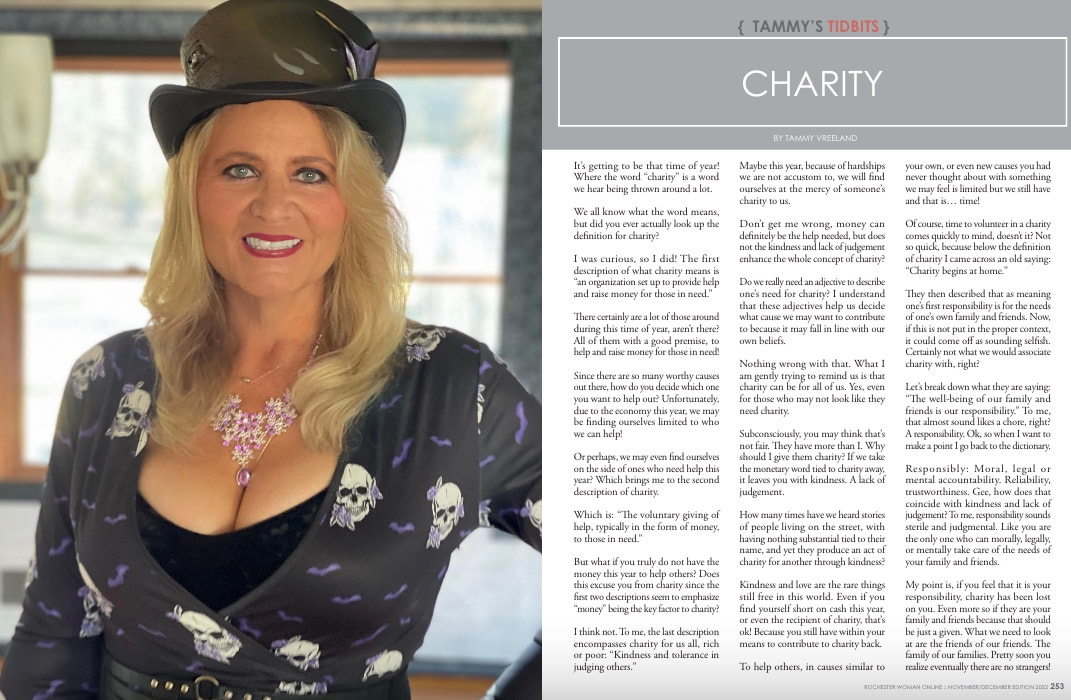Tammy's Tidbits
Charity
Charity
It’s getting to be that time of year! Where the word “charity” is a word we hear being thrown around a lot.
We all know what the word means, but did you ever actually look up the definition for charity?
I was curious, so I did! The first description of what charity means is “an organization set up to provide help and raise money for those in need.”
There certainly are a lot of those around during this time of year, aren’t there? All of them with a good premise, to help and raise money for those in need!
Since there are so many worthy causes out there, how do you decide which one you want to help out? Unfortunately, due to the economy this year, we may be finding ourselves limited to who we can help!
Or perhaps, we may even find ourselves on the side of ones who need help this year? Which brings me to the second description of charity.
Which is: “The voluntary giving of help, typically in the form of money, to those in need.”
But what if you truly do not have the money this year to help others? Does this excuse you from charity since the first two descriptions seem to emphasize “money” being the key factor to charity?
I think not. To me, the last description encompasses charity for us all, rich or poor: “Kindness and tolerance in judging others.”
Maybe this year, because of hardships we are not accustom to, we will find ourselves at the mercy of someone’s charity to us.
Don’t get me wrong, money can definitely be the help needed, but does not the kindness and lack of judgement enhance the whole concept of charity?
Do we really need an adjective to describe one’s need for charity? I understand that these adjectives help us decide what cause we may want to contribute to because it may fall in line with our own beliefs.
Nothing wrong with that. What I am gently trying to remind us is that charity can be for all of us. Yes, even for those who may not look like they need charity.
Subconsciously, you may think that’s not fair. They have more than I. Why should I give them charity? If we take the monetary word tied to charity away, it leaves you with kindness. A lack of judgement.
How many times have we heard stories of people living on the street, with having nothing substantial tied to their name, and yet they produce an act of charity for another through kindness?
Kindness and love are the rare things still free in this world. Even if you find yourself short on cash this year, or even the recipient of charity, that’s ok! Because you still have within your means to contribute to charity back.
To help others, in causes similar to your own, or even new causes you had never thought about with something we may feel is limited but we still have and that is… time!
Of course, time to volunteer in a charity comes quickly to mind, doesn’t it? Not so quick, because below the definition of charity I came across an old saying: “Charity begins at home.”
They then described that as meaning one’s first responsibility is for the needs of one’s own family and friends. Now, if this is not put in the proper context, it could come off as sounding selfish. Certainly not what we would associate charity with, right?
Let’s break down what they are saying: “The well-being of our family and friends is our responsibility.” To me, that almost sound likes a chore, right? A responsibility. Ok, so when I want to make a point I go back to the dictionary.
Responsibly: Moral, legal or mental accountability. Reliability, trustworthiness. Gee, how does that coincide with kindness and lack of judgement? To me, responsibility sounds sterile and judgmental. Like you are the only one who can morally, legally, or mentally take care of the needs of your family and friends.
My point is, if you feel that it is your responsibility, charity has been lost on you. Even more so if they are your family and friends because that should be just a given. What we need to look at are the friends of our friends. The family of our families. Pretty soon you realize eventually there are no strangers!
I like to believe in the good of mankind. Honestly, I don’t like the saying, “Charity begins at home.” Because, for the most part, people do want to help with charity, they just don’t know how.
Perhaps, during this time, we become overwhelmed with the desire to give charity for everyone but are hit with the hard realization we just can’t possibly do that, so why even bother?
When instead if we realize kindness and love comes in many forms and can be an endless source for charity, it becomes easier to accomplish.
Maybe this year we need to become more creative with our charity? Bake an extra pie for a lonely family member. Gather a bundle of wood for a neighbor. Help out at a local food drive. Throw together some milk and cookies, and simply have a game night with some friends.
If you always contribute to one organization for a charity, has that become your responsibility? Why not spread the love around? If you have a set amount every year for one particular charity, how about taking a little from it for a different organization?
And of course, a random act of kindness for a stranger will always be the purest form of charity. There is no right or wrong for charity. All I’m saying is if it has become to feel like a responsibility, you have the power to change that!
When it comes down to it, charity should not be about money. I can guarantee you years from now that family member may not be able to remember what kind of pie you made, but they will remember the kindness behind the act!
Which in turn lets me talk about the judgement part of charity. When people have a need for charity, do they really need to be reminded why that need is there? Can’t we just leave off the adjective of the need and address the need only?
Or perhaps, why not replace charity all together with the word love? Love can be many things. Time, money, effort, whatever it takes to make that person’s need fulfilled.
No, we cannot solve everyone’s needs, but we can give dignity back to people with the knowledge of them, knowing that what we are doing for them is out of love, not necessity or responsibility.
We all know what the word means, but did you ever actually look up the definition for charity?
I was curious, so I did! The first description of what charity means is “an organization set up to provide help and raise money for those in need.”
There certainly are a lot of those around during this time of year, aren’t there? All of them with a good premise, to help and raise money for those in need!
Since there are so many worthy causes out there, how do you decide which one you want to help out? Unfortunately, due to the economy this year, we may be finding ourselves limited to who we can help!
Or perhaps, we may even find ourselves on the side of ones who need help this year? Which brings me to the second description of charity.
Which is: “The voluntary giving of help, typically in the form of money, to those in need.”
But what if you truly do not have the money this year to help others? Does this excuse you from charity since the first two descriptions seem to emphasize “money” being the key factor to charity?
I think not. To me, the last description encompasses charity for us all, rich or poor: “Kindness and tolerance in judging others.”
Maybe this year, because of hardships we are not accustom to, we will find ourselves at the mercy of someone’s charity to us.
Don’t get me wrong, money can definitely be the help needed, but does not the kindness and lack of judgement enhance the whole concept of charity?
Do we really need an adjective to describe one’s need for charity? I understand that these adjectives help us decide what cause we may want to contribute to because it may fall in line with our own beliefs.
Nothing wrong with that. What I am gently trying to remind us is that charity can be for all of us. Yes, even for those who may not look like they need charity.
Subconsciously, you may think that’s not fair. They have more than I. Why should I give them charity? If we take the monetary word tied to charity away, it leaves you with kindness. A lack of judgement.
How many times have we heard stories of people living on the street, with having nothing substantial tied to their name, and yet they produce an act of charity for another through kindness?
Kindness and love are the rare things still free in this world. Even if you find yourself short on cash this year, or even the recipient of charity, that’s ok! Because you still have within your means to contribute to charity back.
To help others, in causes similar to your own, or even new causes you had never thought about with something we may feel is limited but we still have and that is… time!
Of course, time to volunteer in a charity comes quickly to mind, doesn’t it? Not so quick, because below the definition of charity I came across an old saying: “Charity begins at home.”
They then described that as meaning one’s first responsibility is for the needs of one’s own family and friends. Now, if this is not put in the proper context, it could come off as sounding selfish. Certainly not what we would associate charity with, right?
Let’s break down what they are saying: “The well-being of our family and friends is our responsibility.” To me, that almost sound likes a chore, right? A responsibility. Ok, so when I want to make a point I go back to the dictionary.
Responsibly: Moral, legal or mental accountability. Reliability, trustworthiness. Gee, how does that coincide with kindness and lack of judgement? To me, responsibility sounds sterile and judgmental. Like you are the only one who can morally, legally, or mentally take care of the needs of your family and friends.
My point is, if you feel that it is your responsibility, charity has been lost on you. Even more so if they are your family and friends because that should be just a given. What we need to look at are the friends of our friends. The family of our families. Pretty soon you realize eventually there are no strangers!
I like to believe in the good of mankind. Honestly, I don’t like the saying, “Charity begins at home.” Because, for the most part, people do want to help with charity, they just don’t know how.
Perhaps, during this time, we become overwhelmed with the desire to give charity for everyone but are hit with the hard realization we just can’t possibly do that, so why even bother?
When instead if we realize kindness and love comes in many forms and can be an endless source for charity, it becomes easier to accomplish.
Maybe this year we need to become more creative with our charity? Bake an extra pie for a lonely family member. Gather a bundle of wood for a neighbor. Help out at a local food drive. Throw together some milk and cookies, and simply have a game night with some friends.
If you always contribute to one organization for a charity, has that become your responsibility? Why not spread the love around? If you have a set amount every year for one particular charity, how about taking a little from it for a different organization?
And of course, a random act of kindness for a stranger will always be the purest form of charity. There is no right or wrong for charity. All I’m saying is if it has become to feel like a responsibility, you have the power to change that!
When it comes down to it, charity should not be about money. I can guarantee you years from now that family member may not be able to remember what kind of pie you made, but they will remember the kindness behind the act!
Which in turn lets me talk about the judgement part of charity. When people have a need for charity, do they really need to be reminded why that need is there? Can’t we just leave off the adjective of the need and address the need only?
Or perhaps, why not replace charity all together with the word love? Love can be many things. Time, money, effort, whatever it takes to make that person’s need fulfilled.
No, we cannot solve everyone’s needs, but we can give dignity back to people with the knowledge of them, knowing that what we are doing for them is out of love, not necessity or responsibility.







